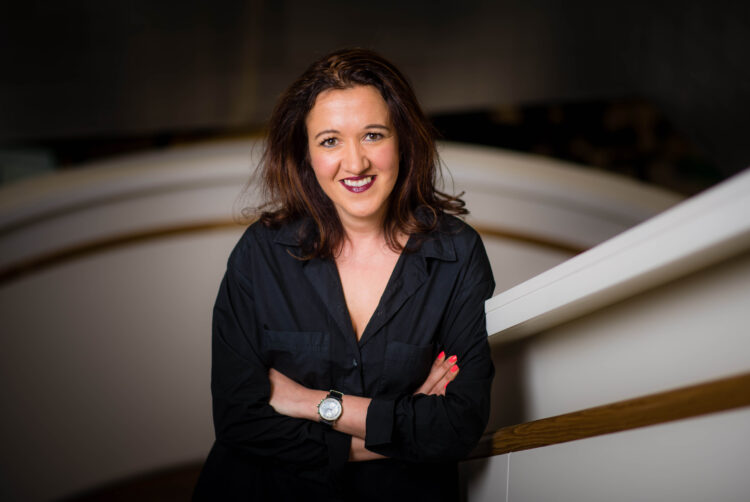TBWA\London CEO Larissa Vince: ‘confidence’ can restore our industry’s mojo

The Media Leader interview
Larissa Vince, a former ad-industry journalist with more than a decade’s agency experience, now finds herself running a network shop. She warns the marketing industry has lost its ‘mojo’ and creatives should embrace the opportunities that different media platforms provide – even if trust, effectiveness, and ad bombardment make the task even harder.
Here’s a little secret about journalists: many of us love nothing more than writing about other journalists.
There’s a particular fascination with those who manage to escape the trade and find plum jobs in business and politics. For many, there is a point when the thrill and novelty of reporting fails to compensate for the long hours, low pay and high stress of publishing Or, as a friend once shockingly said, they thought it was time to “start thinking about getting a proper job”.
Running the country would seem like a proper job; it’s telling that we live in a time where former Spectator editor Boris Johnson is Prime Minister and former Times leader writer (and, lest ye forget, a 1990s Channel 4 chat show host), Michael Gove has been a Cabinet fixture for a decade.
Closer to home, you have Andrew Essex, the Details editor who went on to be founding CEO of Droga5, or Ben Carter, the former Marketing news editor turned chief marketing officer at Just Eat, Purplebricks and (soon to be) Dunelm.
Now Larissa Vince, the former Campaign deputy editor, finds herself in a ‘proper’ job indeed: in September she became CEO of TBWA\London.
After crossing the divide to agency-side 10 years ago in a marketing role at Saatchi & Saatchi, she became MD in 2018 and was headhunted to run indie agency Now in 2019.
‘I’m as surprised as anyone’
Did Vince ever imagine, when she was a advertising trade journalist, quoting CEOs and writing about their ups and downs, that it would one-day be her running an agency and facing the same kind of scrutiny?
“Of course I didn’t!” she exclaims with a laugh. “Journalism has so many transferable skills. But I never thought that, I had no plan at all… I’m as surprised as anyone really.”
But dig deeper and the surprise is not that Vince has succeeded so quickly in agency life, nor that these “transferable skills” are necessarily the explanation for her own ascent.
After quickly transferring from “PR and marketing” at Saatchis, she became a new-business, was then entrusted to run client accounts (including the weighty Direct Line brief) and eventually was elevated to managing director under the formidable CEO, Magnus Djaba.
As Vince explains, it’s the “entrepreneurial” nature of agency environments which enabled her to develop skills and work muscles that she would not have known she had as a reporter or editor.
“Agency environments are really good at recognising and rewarding performance,” she says. “I was good at what I did, so you get given more stuff to do. It’s not like working in a bank where there are grades.
“I was and I still am really good at new business. New business is the lifeblood of agencies and, actually, it’s a particular skill…. Then I discovered that I’m actually also good at client work, and I really like being involved in ‘the work’ and making the work.”
‘Biggest barrier to brilliant creativity is fear’
After leaving Saatchis in 2019 to run the indie creative agency Now, Vince has been poached by Omnicom to take over from Sara Tate, who quit TBWA\London earlier this year to change careers into consultancy and leadership coaching.
She has been reunited with chief creative Andy Jex, with whom she worked at Saatchis, and has been busy recruiting for a new strategy chief after the departure of Anna Vogt, who has just been poached by WPP’s VMLY&R.
Tate, who joined alongside Jex and Vogt in 2017, are credited with turning the agency around after a difficult period in which new-business performance was patchy and there was a vacuum in creative leadership.
 Ancien régime: Vogt, Tate and Jex
Ancien régime: Vogt, Tate and Jex
Since 2017, Tate and Co had delivered revenue growth each year since 2017, although one feels TBWA still lacks the same brand gloss as its Omnicom stablemates Adam & Eve/DDB and AMV BBDO.
So how will Vince be different in leadership style? She recoils when asking to make comparisons with Tate because, “I didn’t actually work with her, so it would be hearsay…”
However, she is “a huge believer in the confidence in a creative business.”
“[The] biggest barrier to brilliant creativity is fear. And that could be fear of losing a client, it could be the fear of not making your numbers… fear of doing the wrong thing.
“If we can create a culture of confidence, where we feel incredibly confident in the quality of our strategic recommendation and the quality of our creative ideas, we will get to better work. So that’s what I see my job as; what I try and do is give my teams that confidence and support and go into battle for them if they need me to.”
“I’m also a really big believer in leading by example…. I love working on clients, I love getting involved in the work, [but] I absolutely do not see my job as to be a sort of helicopter person wandering around telling other people what to do.”
‘Trust in digital media suffers from lack of value exchange’
The idea of confidence, whether when talking about individuals or the collective agency, is common refrain. Vince thinks the industry has “lost its mojo” and has “forgotten to be proud of what it does.”
“Now there is a bit of self-flagellation about the merits of creating advertising at all! Let’s be proud that we create brilliant, creative work that creates demand for brands – that’s a brilliant thing.”
Vince points to many reasons as to how this has happened. “We’re not in a great market, a contracting market – people are under pressure. We’ve written and talked for years about the cycle of pressure on agency fees and people charging less for what they do and that just creates downward spiral where you feel more like a supplier partner.
“People are very understandably concerned with brand purpose. Brand purpose can be brilliant but we have to remember that companies give back to the world in lots of different ways; they are employers of people and help sustain economies. There are other ways in which businesses contribute to society as a whole [and] it doesn’t always have to be about purpose. Sometimes I worry that we focus so much on that, that we forget to be proud of the good things that our brands or our businesses do.”
That’s all well and good, but does she feel that ad agencies are paying for the sins of digital media? As Nick Manning has written about extensively for Mediatel News lately, the advertising market has become “dysfunctional” and has helped erode trust and effectiveness in advertising generally.
Interestingly, while Vince says she doesn’t hear people complain about issues such as ad bombardment, ad fraud, and trust, she thinks it “might be having an impact even if they don’t notice”.
“If you ask people, real people (not advertising people!) what they think about advertising, compared to 20 or 50 years ago, people are not in any way as positive about advertising as they used to be. That’s a bit sad, isn’t it?
“That’s probably as a result of, as you put it, people being bombarded constantly by ads in different environments and therefore not thinking that advertising is, is a positive thing people used to enjoy. I think, being entertained by advertising, or having understood that there was a value exchange or tacit acceptance from people that if I watch free-to-air television… I understand I will get ads in return for the programming.
“The problem is there has been no tacit sort of contract between consumer and platform…. people don’t feel they’ve said ‘yes, it’s fine to chase me around the internet, because I once search for a pair of trousers’. “
Creatives must ‘spend time with media channels’
TBWA has media planners on its employment books, such as those who work on the global integrated Nissan United account.
However, Vince is clear that it’s also up to ‘creatives’ to look at different media channels as distinct marketing challenges. She cites a recent TBWA\London victory for Twitter’s annual #PoweredbyTweets competition as an example of how the agency can excel with creating ideas where “the platform is baked into the creative”.
“If you create something for TikTok, it’s completely different from anything else; the creative challenge is completely different,” she adds. “You couldn’t take an ad designed to be used in Facebook and put it in TikTok, it just wouldn’t work. That’s a really interesting, creative challenge.
“But [creatives] have to spend time understanding the platforms. It wasn’t so necessary in a more traditional media world, everyone understood what a TV ad was, everyone understood what a poster was, right? It was relatively simple. Now the creatives need to spend time with the media channels to understand the creative opportunities that exist and how they can communicate in those environments.”
Even as creative and media seem to inch closer together as disciplines in a digital world, Vince, whose favourite ad is the visually arresting Sony “Balls”, maintains that great advertising “is always looking for an idea and not an execution.”
“If you get [the idea] right, you will be able to execute brilliantly, regardless of the channel but the execution might be different…. Yes, you can create for TV and above-the-line media but also, you can have strong conversations in earned channels, which might be social, might be PR.
“Let’s face it – work, internally as well as externally, has to give the company something to feel excited about.”
That word “confidence” reappears as Vince goes on to explain how her client at Direct Line admitted that Saatchi & Saatchi’s famous and award-winning “Winston Wolf” ad campaign (above) featuring Harvey Keitel helped the brand regain its confidence in a marketing sense.
“The client said: ‘You gave us our confidence back as an organisation’,” she beams. “I mean, that’s an amazing thing, isn’t it? Like, that was my best thing… that a creative idea could do that.”
Vince clearly has no shortage of confidence, either in her abilities or what this Omnicom-owned agency can do, despite the challenges that the ad agency model faces as media fragments and brands demand more for less. For the moment at least, this former journalist still has a good story to tell.
Media Leaders: Mediatel News’ weekly bulletin with thought leadership and analysis by the industry’s best writers and analysts.
Sign up for free to ensure you stay up to date every Wednesday.



